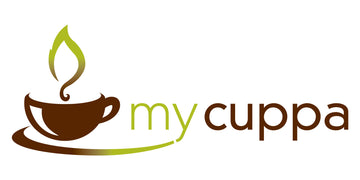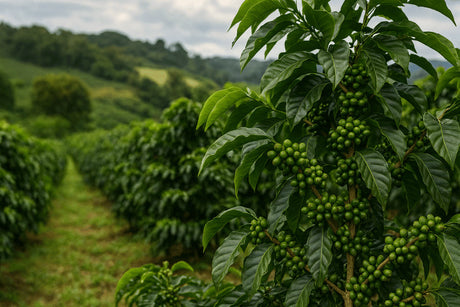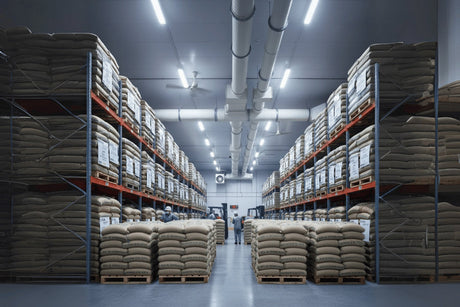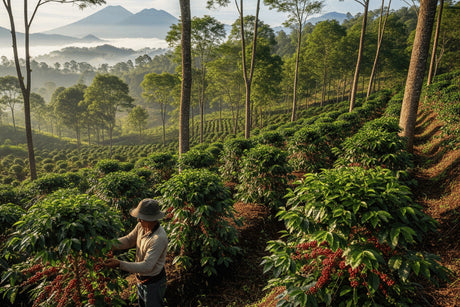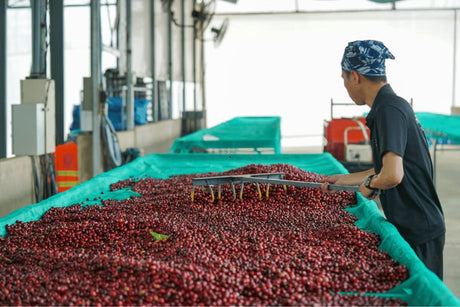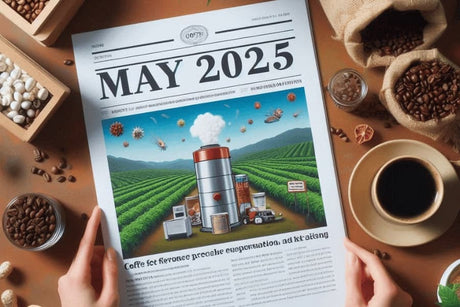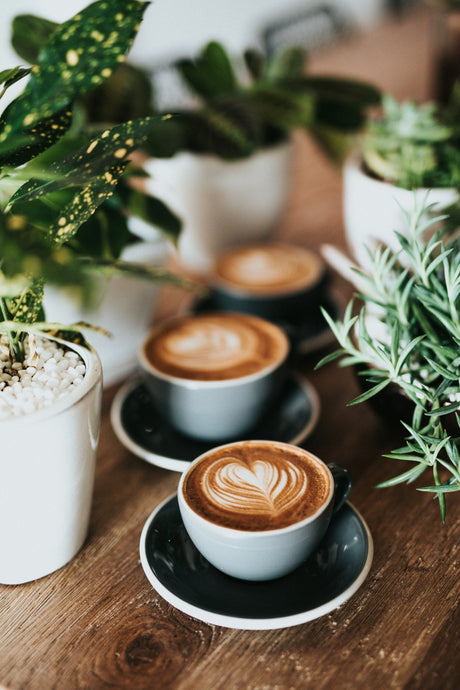"We make a living by what we get, we make a life by what we give.”- Winston Churchill
mycuppa October 2023 Newsletter
Only two weeks ago, the Bureau of Meteorology confirmed that Australia is officially experiencing an El Nino weather pattern after months of speculation.
El Nino brings hot, dry weather and increased risks of drought or bushfires.
We have been through a few El Nino seasons, and they were challenging. In 2007, we designed and built a temperature-controlled environment essential to maintain quality and consistency in coffee.
Back then, nobody was doing anything like this for roasting coffee.
Not much has changed for some coffee brands today, as we see them storing pallets of raw and roasted up high where it can be +15 C warmer, or there is no cooling and limited ventilation in warehouses.
We continue to invest in the effort and expense of managing stable temperatures for our raw and roasted coffees.
Heat is a highly effective way to degrade coffee quality.
Heat stress during summer transit or in warmer parts of Australia is an unmitigated risk of having any ingredients delivered, not just roasted coffee.
We have looked at alternative packaging materials, but the cost and negative environmental impact have made these solutions unworkable. But we continue to explore better concepts that further protect and preserve quality.
A pleasant surprise
Entirely out of the blue, a new arrival from Peru has wowed us with its delicious cup profile. Sneakily flying under the radar, goodness me, it's nice. Read more below.
Kenyan Coffee supply still temporarily halted.The situation with the supply of Kenyan coffees has continued to deteriorate with no resolution in sight. Please read our article below.
Secret Label
October's Secret Label is another love story of elegant sweetness. Yes, we are suckers for the sweet stuff, and this baby has it in spades. Wowsa.
There can be no other coffee that excites and delights us more than Secret Label.
It's both a challenge and a reward at the same time.
Coming up with something new and different is getting harder each month.
Often, my mind is racing way ahead, simultaneously planning out the next three months of Secret Label coffee whilst crafting the current month.
October's Secret Label fell into place relatively quickly as this month's brief was a lean-in to the conservative and refined elements.
Sweet milk chocolate brings effortless drinking simplicity that anyone enjoys.
For textural components, we added nuts, honey, toffee and nougat.
But for us, the highlight would have to be the soaring sweetness of cooked passionfruit, which is perfectly balanced without taking over the cup.
Grab it here - Secret Label

A hidden gem - Peru Chanchamayo
Peru is a coffee-growing origin living in the shadows of its more famous neighbours; whether it's the sheer size and industrial scale of Brazil's well-organised coffee industry or the broad diversity of Colombia's numerous coffee-growing departments, Peru seems like a minnow.
Peru's challenges include no central coffee organisation and a lack of essential infrastructure, with most small land holdings operating on limited access to capital.
Coffee farming in Peru has a history of being positioned in the commodity segment as a supplier of sweet arabicas, ideal for blending.
But Peru's coffee has always possessed tremendous potential.
Its farmers collectively began a long journey to shift away from being known as commodity-grade suppliers.
In the modern era, Peru is the largest provider of certified arabica coffees, such as Organic and FAIRTRADE. On a global scale, Peru is a significant player in Arabica coffee, sitting around 6th by volume.
Peru was one of the first origins we sourced back in 2007, and we have always regarded Peru as a producer of excellent-tasting coffees possessing delicious sweetness and sparkling acidity.
So when a new lot arrived last month without any warning or notice of its inherent quality, we were surprised at the stunning result.
We love the juicy malic acidity with mellow cola and cooked passionfruit sweetness.
Grab it here - Peru Chanchamayo

A long wait gets even longer.
Kenya has a well-earned reputation for producing some of the world's finest-tasting coffees. Clean, robust and sweet in flavour with that unmistakable trademark bold cup acidity.
It's also the most expensive on an average basis. Generally, Kenyan coffees command a price premium of around 30 - 40% per kilo above other origins. At times (like now), the price premiums can stretch to 50% above competing coffee origins.
Earlier this year, the Kenyan Government dramatically intervened to shut down the trading of coffee by revoking all licenses for agents and mill operators.
It's a complex set of problems - since 1988, Kenya's production volumes have dropped by 70%; some of that fall might have come due to extreme weather challenges in East Africa, especially in the last decade of persistent drought.
Coffee is essential to Kenya's economy as it's 3rd most significant agricultural export, employing around 600,000 coffee farmers.
The Government hopes their new reforms will improve the profitability of coffee farming in Kenya by redistributing wealth fairly with higher prices going to farmers.
Kenya's Government hopes to boost coffee production volumes by helping farmers recognise improved returns from the new reforms.
But the issues are deep-seated.
Kenya coffee's marketing, selling and trade has consolidated significantly over the last 20 years. There are a small number of entities (count on a single hand) - called intermediaries.
Allegedly, the coffee trading and settlement systems were prone to bribery, corruption and agents acting outside the best interests of farmers by profiteering themselves.
The high prices paid for Kenyan coffees were not flowing back to farmers but instead lining the pockets of the limited agents and mill owners.
As the Government revoked trading licenses and introduced regulatory reforms, additional, independent points are now within the supply chain to prevent market manipulation.
The impact of the supply chain interruption is vast.
Coffee remains stranded in Kenya, with barely 5% of the export volumes flowing compared to the periods before Government intervention.
We hear reports of raw coffee in parchment stockpiled in farms and Co-ops as it can't be milled or waiting on Mills to obtain new licences.
Those delays will not help quality.
The global supply of Kenyan coffee has stopped. The only lots available dramatically increase in price whilst shortages continue.
There continues to be deep concern expressed within the global coffee industry about the excessive time taken to implement reforms.
Recently harvested coffee is now at risk of not being sold or degrading in quality.
As a prominent seller of single-origin Kenyan coffee to the consumer market, we hold a decent inventory level. However, our concerns shift to whether the new season harvest will ever become available.
